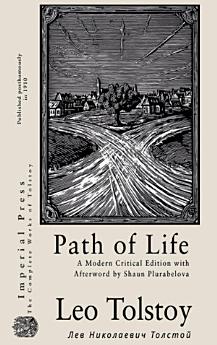Path of Life
About this ebook
"Path of Life," or "Путь жизни" in Russian, was compiled by Leo Tolstoy between 1903 and 1910, and published in 1910. This book represents the culmination of Tolstoy's life's work, serving as his final philosophical and spiritual testament. It brings together his own thoughts and selected quotations from various world philosophers and sages, including Kant, Lessing, Marcus Aurelius, Rousseau, Schopenhauer, Ramakrishna, Grigory Skovoroda, and John Chrysostom.
The composition is a collection of reflections on fundamental human concerns such as death and immortality, the nature of true religion and faith, the meaning of love, and the purpose of life. It was preceded by other similar compilations like "Thoughts of Wise People," "Circle of Reading," and "For Every Day". "Path of Life" functions as Tolstoy's spiritual instruction, a guide for readers seeking to understand his mature worldview and his ultimate conclusions on how one should live.
This critical reader's edition presents a modern translation of the original manuscript, crafted for the modern reader with clean, contemporary language and simplified sentence structures that clarify his complex Russian phrasing and specific antiquated references. Supplementary material enriches the text with autobiographical, historical, and linguistic context, including an afterword by the translator on Tolstoy’s personal history, impact, and intellectual legacy, an index of the philosophical concepts he employs—emphasizing Existentialism and influence by Schopenhauer—a comprehensive chronological list of his published writings, and a detailed timeline of his life, highlighting the personal relationships that shaped his philosophy.











